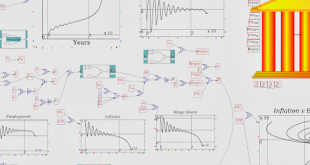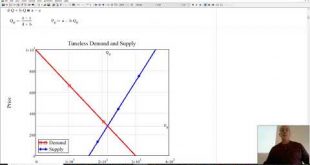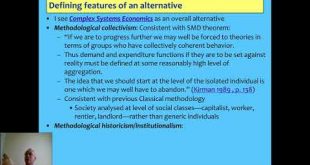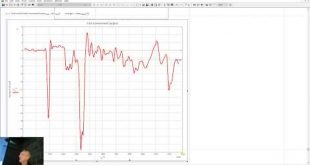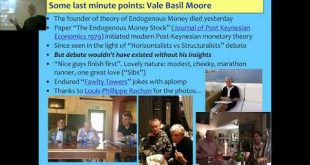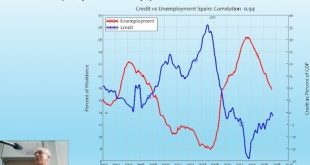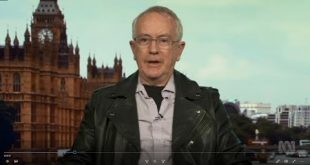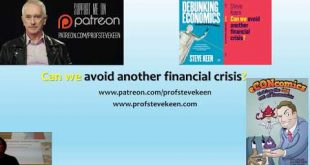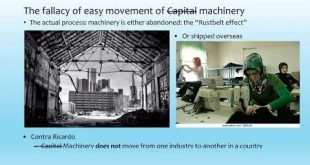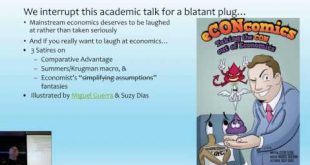test
Read More »Analyzing dynamic models (1/2) Kingston Economic Change & Ideas. The basics.
This is the first of a two-part lecture on the basics of analyzing a dynamic model, written for a mixed audience of students ranging from engineers to whom this stuff is old hat, to students who have done no mathematics since high school (apart from, for most of them, what they encounter in a standard economics undergraduate degree). I doubt that this will have much of an audience outside my students, but you never know! The one part of economic interest comes towards the end when I discuss...
Read More »Kingston Masters Economic Change and Ideas Lecture 08
This lecture starts with Yaroufakis's critique of Neoclassical methodology and then proposes an alternative based on macroeconomic definitions and complexity theory. I build a couple of dynamics models in Minsky from scratch, and I make a few mistakes too on the way too (which I corrected once back at home, and inserted into this video). One additional mistake was that I stuffed up the sliding window graph feature of Minsky by having the boundaries the wrong way around. That's fixed in the...
Read More »Talk with Positive Money in Hackney
This was a fairly "a la carte" presentation of why bank creation of money matters as part of a Positive Money talk at the Hackney Downs Studios on March 14 2018. I started with how mainstream economists like Paul Krugman ignored banks in macroeconomics, until the Bank of England came out and stated definitively that banks create money, and they're not constrained by their Reserves or Reserve Ratios in doing so. Now there's a classic mainstream economics paper claiming that there's no...
Read More »Lecture 07/08 Endogenous Money & a tribute to Basil Moore
I heard from Louis Philippe Rochon that Basil Moore had died, just before I flew back to London after speaking in Brussels the previous two days, and I was rather emotional as I gave my Kingston Masters class an unexpected tribute to his work. I also cover further developments in the role of energy in production, and the impact of money being created by new bank debt. I illustrate the difference between the Neoclassical fantasy of Loanable Funds and the real world situation of...
Read More »European Commission Talk March 7th 2018. Has Europe really recovered?
This invitation came about thanks to Full Circle (http://fullcircle.eu/), which tries to promote open-minded debate in Brussels on a wide range of issues. I've been very critical of the Eu's economic policies in the past, so it was great to be able to speak within the Commission to an audience of about 50 people there, about half of whom were economists. The debate after my talk was excellent, and I hope the audio is OK on this recording.
Read More »Australia’s approaching private debt crisis on ABC TV Matter Of Fact with Stan Grant
This was a very good panel discussion, prompted both by the private debt data for Australia, and Stan Grant's review of and commentary on my book "Can we avoid another financial crisis?", which notes that Australia is one of the countries that I expect to have a debt crisis in the next 1-2 years. The video is not available to viewers outside Australia, so I'm making it available here. If it later is available via an ABC channel, I'll happily delete it from here. The discussion starts 6...
Read More »Mainstream economics: equilibrium barter models for a far-from-equilibrium monetary economy
I had prepared a set of slides on "Can we avoid another financial crisis?", but with an audience exclusively of economics students at Sheffield University today, and pressed for time, I "went rogue", and challenged the limited nature of the "education" they get in economics today. Gee it felt good! I've endured seeing rubbish portrayed as reason in economics for 45 years now, and I've hardly been silent about it of course. But I really cut loose tonight. 46 years ago, I was doing what...
Read More »The key logical fallacy in the case for free trade
Ricardo's theory of trade is in many ways the foundation of conventional economic thinking: output and welfare can be increased by removing barriers to markets reaching equilibrium prices. In this case, the barriers are restraints on international trade, and output and welfare are increased by each country specialising in the good(s) in which it has a comparative advantage. The key fallacy in the argument is the belief that machinery can be switched from one industry to another without...
Read More »Complex Systems Economics to Sussex University Evolutionary & Adaptive Systems Research Group
This talk was a pleasure to give, because for once I was talking to an audience who completely understand Complex Systems (unlike the vast majority of economists), but in the case of "EASY"--the "Evolutionary and Adaptive Systems Research Group"(http://www.sussex.ac.uk/easy/)--they apply this methodology to analysing the brain and consciousness. I outline Minsky (downloadable from https://sourceforge.net/projects/minsky/), the system dynamics platform I designed for economics to enable...
Read More » Steve Keen’s Debt Watch
Steve Keen’s Debt Watch

